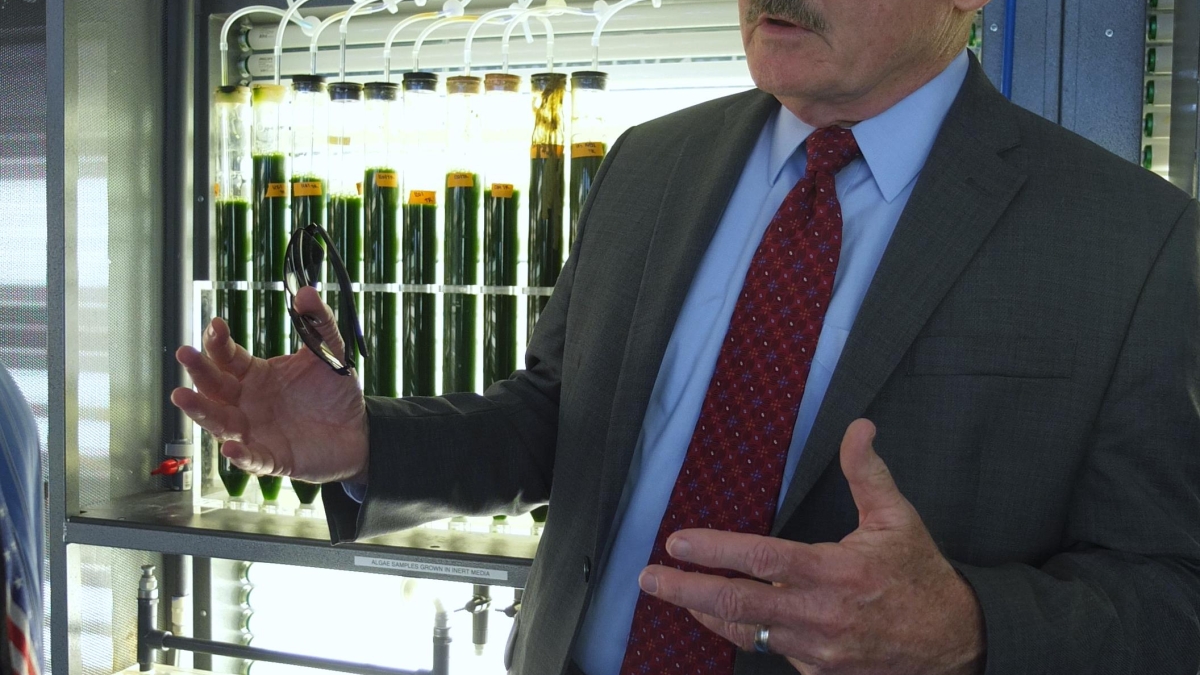US Navy supports ASU's development of algae-based biofuels

The similarities between the U.S. Navy and civilian cities and industry may not be readily apparent, said Dennis McGinn, U.S. Navy Assistant Secretary for Energy, Installations and Environment, but in the realm of energy use and reliability, there are often parallel problems to be solved. Where there are overlapping issues, such as cost, sustainability, efficiency and energy security, McGinn said the Navy is interested in working with research institutions and industry to improve the energy outlook for all.
“We are thinking about energy in three different ways: first in technology terms; biofuels, wind and solar energy storage, power grid systems and more,” McGinn said during a visit to Arizona State University. “But it takes two other critical elements to achieve our energy goals: partnerships and culture. This is why we’re interested in forging and strengthening relationships with outstanding organizations like ASU.”
While the Department of the Navy broadly funds energy research, another key aspect is its considerable influence in setting purchasing standards for their operations. The Navy is using its authority under the Defense Production Act, which allows the Navy, in partnership with the U.S. Department of Energy (DOE) and the U.S. Department of Agriculture (USDA) to invest in industries that are determined critical to national security; in this case, biofuels. McGinn said that the Navy has already invested millions in projects with the DOE and USDA in order to bring down the cost of producing biofuel.
“The Navy wants to buy anywhere between 10 and 50 percent biofuel blends for our ships,” he said. “We want it to be a cost-competitive program. We are working specifically with the USDA to bring down biofuel costs to $3.50 a gallon or less at the commercial scale of 170 million gallons a year by 2016.”
As part of his visit to ASU, McGinn toured the Arizona Center for Algae Technology and Innovation (AzCATI) at the Polytechnic campus in Mesa. As the largest university-based algae facility on the globe, AzCATI leads the DOE-funded national algae testbed, the Algae Testbed Public-Private Partnership (ATP3). The Navy has interest in the work done by AzCATI and ATP3, especially if the cost of creating algae biofuels can shrink to compete with traditional fuel markets, McGinn said.
“The Department of the Navy is very interested in developing alternative transportation fuel to power our fleets,” he said. “Algae biofuel represents great potential in that it is sustainable and scalable. That’s why we’re interested in working with ASU and the industry to advance this technology."
The use of U.S.-made, renewable fuels may not only assist the Navy in becoming more sustainable and independent, but it may also help the nation achieve even better national and economic security.
“Globally, there is a continuing overreliance on fossil fuel. And while we are very appreciative and view it as a blessing to our country to have this current oil and gas boom, in the national security business we get paid to look over the long-term horizon,” said McGinn. “When we look 15 or 20 years out into the future, we see significant potential for great competition, and even conflict, related to increasing world demand for petroleum.”